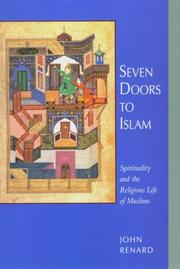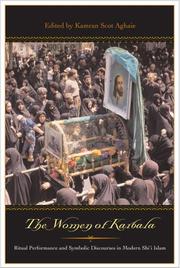| Listing 1 - 10 of 36 | << page >> |
Sort by
|
Book
ISBN: 284161011X 9782841610112 Year: 1999 Publisher: Beyrouth : Al-Bouraq Editions,
Abstract | Keywords | Export | Availability | Bookmark
 Loading...
Loading...Choose an application
- Reference Manager
- EndNote
- RefWorks (Direct export to RefWorks)
Religious life --- Islam --- Islam. --- doctrines --- Doctrines --- Religious life - Islam. --- Islam - Doctrines --- ISLAM --- DROIT ISLAMIQUE --- DOCTRINES --- INTRODUCTION

ISBN: 2866002334 Year: 1985 Publisher: Paris
Abstract | Keywords | Export | Availability | Bookmark
 Loading...
Loading...Choose an application
- Reference Manager
- EndNote
- RefWorks (Direct export to RefWorks)
Islam --- 297 --- Islamic ethics --- Religious life --- -Religion --- Muslim ethics --- Religious ethics --- Islam. Mohammedanisme --- -Islam. Mohammedanisme --- Religious life (Islam) --- Shīʻah

ISBN: 0520917472 0585079161 9780520917477 9780585079165 0520200950 0520204174 9780520200951 9780520204171 Year: 1996 Publisher: [Place of publication not identified] University of California Press
Abstract | Keywords | Export | Availability | Bookmark
 Loading...
Loading...Choose an application
- Reference Manager
- EndNote
- RefWorks (Direct export to RefWorks)
Seven Doors to Islam reveals the religious worldview and spiritual tradition of the world's one billion Muslims. Spanning the breadth of Islamic civilization from Morocco to Indonesia, this book demonstrates how Muslims have used the literary and visual arts in all their richness and diversity to communicate religious values. Each of the seven chapters opens a "door" that leads progressively closer to the very heart of Islam, from the foundational revelation in the Qur'an to the transcendent experience of the Sufi mystics. However, unlike most studies of Islam, which see spirituality as the concern of a minority of mystical seekers, Seven Doors demonstrates its central role in every aspect of the Islamic tradition.
Religious life --- Islam --- Religion --- Philosophy & Religion --- Mohammedanism --- Muhammadanism --- Muslimism --- Mussulmanism --- Religions --- Muslims --- Religious life (Islam) --- Shīʻah --- Islam.
Book
ISBN: 1469621177 1469624958 9781469624952 9781469621173 9781469621166 1469621169 9781469659121 1469659123 9798890843562 Year: 2015 Publisher: Chapel Hill
Abstract | Keywords | Export | Availability | Bookmark
 Loading...
Loading...Choose an application
- Reference Manager
- EndNote
- RefWorks (Direct export to RefWorks)
"Kishwar Rizvi, drawing on the multifaceted history of the Middle East, offers a richly illustrated analysis of the role of transnational mosques in the construction of contemporary Muslim identity. As Rizvi explains, transnational mosques are structures built through the support of both government sponsorship, whether in the home country or abroad, and diverse transnational networks. By concentrating on mosques--especially those built at the turn of the twenty-first century--as the epitome of Islamic architecture, Rizvi elucidates their significance as sites for both the validation of religious praxis and the construction of national and religious ideologies"--
Religious life --- Mosques. --- Religious life (Islam) --- Architecture, Asian --- Islamic architecture --- Religious institutions --- Islam. --- Mosques --- 726.2 --- 726.2 Moskeeen. Minaretten --- Moskeeen. Minaretten --- Islam --- Shīʻah
Book
ISBN: 1891294997 9781891294990 Year: 1998 Publisher: Stanmore World Federation of Khoja Shia Ithna-Asheri Muslim Communities
Abstract | Keywords | Export | Availability | Bookmark
 Loading...
Loading...Choose an application
- Reference Manager
- EndNote
- RefWorks (Direct export to RefWorks)
Islam --- Imams (Shiites) --- Religious life --- Muslims --- Hadith (Shiites) --- Conduct of life --- Early works to 1800. --- Religious life - Islam - Early works to 1800. --- Muslims - Conduct of life - Early works to 1800.
Book
ISBN: 9004098186 9789004098183 9789004450431 Year: 1994 Volume: 18 Publisher: Leiden : E.J. Brill,
Abstract | Keywords | Export | Availability | Bookmark
 Loading...
Loading...Choose an application
- Reference Manager
- EndNote
- RefWorks (Direct export to RefWorks)
This important Book of Dreams K. al-Manām by Ibn Abī al-Dunyā (d. 281/894), a compendium of 350 Muslim dream narratives in Arabic, is now critically edited for the first time. Although dream accounts are scattered throughout most genres of classical Arabic literature, K. al-Manām is the only extant treatise dedicated solely to this topic. With the aim to provide the pious Muslim with a code of behaviour, the book relates dreams that deliver clear messages, of the kind that can be followed with no need for interpretation. The scholarly introduction in English gives a survey of the contents of the Arabic text, emphasizing the unique features of the book, while concentrating on their contribution to practical ethics, and examines the role dreams play in various genres of classical Arabic literature.
Dreams --- Salvation --- Religious life --- Early works to 1800. --- Islam --- Dreams - Early works to 1800. --- Salvation - Islam - Early works to 1800. --- Religious life - Islam - Early works to 1800. --- Religion --- Early works to 1800

ISBN: 0791489272 1417506792 9781417506798 0791452379 9780791452370 0791452387 9780791452387 9780791489277 Year: 2003 Publisher: Albany : State University of New York Press,
Abstract | Keywords | Export | Availability | Bookmark
 Loading...
Loading...Choose an application
- Reference Manager
- EndNote
- RefWorks (Direct export to RefWorks)
Kernel of the Kernel is an authoritative work on Sufism from a Shi'i perspective that is not only fascinating, but also contains much practical advice. In addition to providing a theoretical discussion of spiritual wayfaring, it is also the account of a personal fifty-year spiritual journey by Sayyid Muḥammad Ḥusayn Ṭabāṭabā'ī, a renowned Iranian-Shii scholar and spiritual master. In Kernel of the Kernel, Ṭabāṭabā'ī discusses the doctrinal foundations of spiritual wayfaring as well as processes and stages that an aspiring wayfarer must go through in order to attain spiritual realization. He discusses the relation between the exoteric and esoteric aspects of Islam and clearly demonstrates that these inward and outward dimensions of Islam complement each other. The book also provides information on the Quranic origins of Sufism and its special relations with Shi'ism as well as the role of Shi'i Imams in the spiritual realization of a sincere wayfarer.
Sufism. --- Islam --- God (Islam) --- Religious life --- Sofism --- Mysticism --- Essence, genius, nature. --- Koranic teaching. --- Shīʻah. --- Koranic teaching --- Shiite authors --- Shiites --- Religious life (Islam) --- Shīʻah --- Imamites --- Shia --- Shiism --- Twelvers (Islam) --- Islamic sects --- Alids --- Islam. --- Shiah.


ISBN: 9780292796577 9780292709362 0292796579 9780292709591 Year: 2021 Publisher: Austin
Abstract | Keywords | Export | Availability | Bookmark
 Loading...
Loading...Choose an application
- Reference Manager
- EndNote
- RefWorks (Direct export to RefWorks)
Commemorating the Battle of Karbala, in which the Prophet Mohammad's grandson Hosayn and seventy-two of his family members and supporters were martyred in 680 CE, is the central religious observance of Shi'i Islam. Though much has been written about the rituals that re-enact and venerate Karbala, until now no one has studied women's participation in these observances. This collection of original essays by a multidisciplinary team of scholars analyzes the diverse roles that women have played in the Karbala rituals, as well as the varied ways in which gender-coded symbols have been used within religious and political discourses. The contributors to this volume consider women as participants in and observers of the Karbala rituals in Iran, Iraq, Lebanon, India, Pakistan, and the United States. They find that women's experiences in the Shi'i rituals vary considerably from one community to another, based on regional customs, personal preferences, religious interpretations, popular culture, and socioeconomic background. The authors also examine the gender symbolism within the rituals, showing how it reinforces distinctions between the genders while it also highlights the centrality of women to the symbolic repertory of Shi'ism. Overall, the authors conclude that while Shi'i rituals and symbols have in some ways been used to restrict women's social roles, in other ways they have served to provide women with a sense of independence and empowerment.
Karbalāʼ, Battle of, Karbalāʼ, Iraq, 680 --- Muslim women --- Religious life --- Shīʻah --- Karbalāʾ (Iraq), Battle of, 680 --- Kerbela, Battle of, Karbalāʾ, Iraq, 680 --- Imamites --- Shia --- Shiism --- Twelvers (Islam) --- Islamic sects --- Alids --- Religious life (Islam) --- Rituals
Book
ISBN: 2711609006 9782711609000 Year: 1986 Volume: 29 Publisher: Paris : Librairie J. Vrin,
Abstract | Keywords | Export | Availability | Bookmark
 Loading...
Loading...Choose an application
- Reference Manager
- EndNote
- RefWorks (Direct export to RefWorks)
God (Islam) --- Religious life --- Worship and love --- Early works to 1800 --- Islam --- -Religion --- -Early works to 1800 --- Early works to 1800. --- -Islam --- Religion --- Allah --- Monotheism (Islam) --- Worship and love&delete& --- Islam&delete& --- God (Islam) - Worship and love - Early works to 1800 --- Religious life - Islam - Early works to 1800
Book
ISBN: 9781848856493 1848856490 Year: 2012 Publisher: London I.B. Tauris
Abstract | Keywords | Export | Availability | Bookmark
 Loading...
Loading...Choose an application
- Reference Manager
- EndNote
- RefWorks (Direct export to RefWorks)
Shi'ah --- Shiites --- Identity (Psychology) --- Religious life --- Chiisme --- Chiites --- Identité (Psychologie) --- Vie religieuse --- Religious aspects --- Islam --- Aspect religieux --- Shīʻah --- Identité (Psychologie) --- Imamites --- Shia --- Shiism --- Twelvers (Islam) --- Islamic sects --- Alids --- Personal identity --- Personality --- Self --- Ego (Psychology) --- Individuality --- Religious aspects&delete& --- Shiite authors --- Religious life (Islam)
| Listing 1 - 10 of 36 | << page >> |
Sort by
|

 Search
Search Feedback
Feedback About UniCat
About UniCat  Help
Help News
News